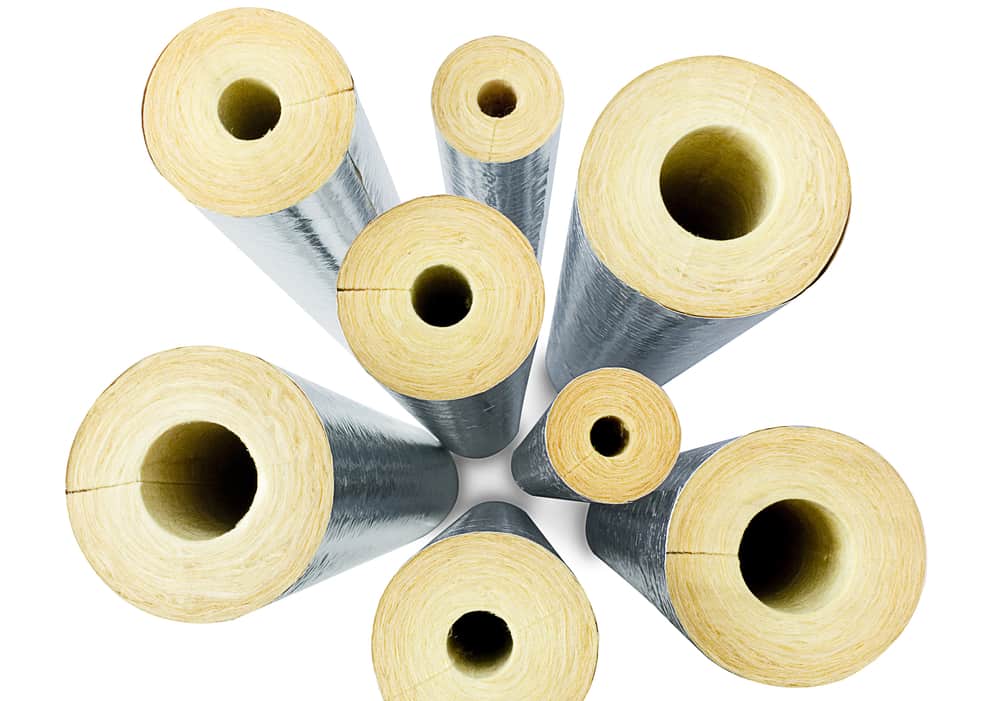Rockwool insulation’s benefits in industrial environments can’t be underestimated. From its thermal insulation properties to maintaining energy efficiency, as well as its sound-absorption properties and fire-safety qualities, Rockwool insulation is an invaluable addition to your piping projects.
THE ROCKWOOL RECAP
Not enough time to read the whole article? Here’s what you need to know:
- Rockwool provides exceptional thermal performance, helping you save on energy
- It’s also outstanding for sound insulation, helping keep systems quiet and helping you meet noise pollution regulations
- It’s fire-resistant and non-combustible for your safety
- It can last up to 30 years with little to no maintenance
- It’s made from naturally occurring, renewable materials and has a high degree of recyclability
Rockwool is a kind of stone wool insulation, created by heating natural rock to high temperatures and spinning it into fibres. After spinning, they’re formed into the shapes needed to create insulation products for construction, piping, and industrial facilities.
Used in HVAC systems and both hot and cold water, Rockwool insulation is a truly hardy, heat-efficient multipurpose insulation option for your project.
Understand the five reasons to choose Rockwool for your industrial projects with our guidance. Here, we’re exploring its high performance across a range of areas, so you can make the right choice for your insulation project.
1. Excellent thermal insulation and energy efficiency
Rockwool pipes retain their temperature at an exceptional rate. Its thermal performance is one of the key reasons it’s used in other kinds of insulation projects, such as in homes and office structures: it keeps the internal temperature stable and maximises comfort.
It acts as a barrier, preventing heat transfer across your system, which can decrease heating and cooling costs associated with your industrial applications. This doesn’t just reduce costs – it can even reduce your carbon footprint by lowering energy consumption. This thermal performance compares well to other insulation products: it has a high R value, meaning that it provides a higher degree of insulation in relation to the material thickness.
2. Sound insulation
Noisy pipes can be a real pain in both residential and commercial premises. Rockwool insulation has exceptional sound absorption qualities, which means it helps create quieter functioning for your system. This acoustic performance also extends to absorbing vibrations and echoes. Not only does it create a more peaceful environment, but it can also help you comply with relevant building codes in both residential and commercial applications around noise control.
3. Fire protection
Fire safety is one of the key reasons that this form of insulation is so popular. Rockwool insulation is non-combustible, providing passive fire protection in systems where it’s used. When burned, it doesn’t produce significant amounts of toxic smoke, which can help to prevent smoke inhalation in the event of a fire.
Its fire resistance also stems from its high temperature resistance: it can withstand temperatures above 750°C, with some products able to withstand temperatures above 1000°C. If you’re looking for insulation with a high level of fire resistance, Rockwool insulation is an exceptional choice.
4. Durability
Rockwool insulation stands the test of time and tends to require very little maintenance. Its inorganic composition means that pests like insects and rodents aren’t attracted to it. As a result, it stays cleaner and degrades less. It’s also got a solid degree of resistance to other common causes of decay, like chemical exposure and moisture. For these reasons combined, Rockwool Insulation can last more than 30 years without needing replacement.
5. Renewable and recycled components
Rockwool is made from diabase rock, which is a renewable form of stone. As diabase rock is constantly being produced by the Earth, you can feel confident that your insulation choice isn’t significantly contributing to environmental degradation. Plus, at the end of its life, much of your Rockwool insulation products can be recycled for use in further insulation, contributing to a circular economy.
Why Trust All Insulation & HVAC Supplies for Your Rockwool Insulation Needs?
We’ve worked in the insulation space for over two decades now – we know how to optimise systems for safety and energy efficiency. We work with project managers, contractors, and construction companies, supplying materials to their exact specifications. Our focus is on delivering reliable, high-performance solutions for industrial, residential, and commercial projects at affordable prices. We offer fast, local service, so you can get your job done on time and within your budget.
If you’re looking for sectional pipe insulation that delivers energy efficiency, thermal insulation, acoustic performance, fire protection, whilst also being durable and sustainable, Rockwool pipe is a top pick. If you’re weighing up the thermal insulation options for your next project, give us a call! We’ve got an exceptional range of Rockwool insulation products (as well as many others) to meet your needs.
Have a Question?
"*" indicates required fields
Frequently Asked Questions
Rockwool insulation is known for its excellent heat resistance. It can typically withstand continuous temperatures up to 650°C and short-term exposure beyond 1000°C, depending on the product grade.
Rockwool has a thermal conductivity of approximately 0.033–0.045 W/m·K, depending on the density and temperature of your insulation.
Rockwell insulation products are very effective in this context. Rockwool’s low thermal conductivity means it resists heat flow, helping reduce energy loss and maintain system efficiency.
Yes, it is suitable for both hot and chilled water pipes, HVAC lines, and process piping. For cold applications, a vapour barrier is often recommended.
Yes. Rockwool has excellent sound-absorbing properties and can significantly reduce noise from mechanical systems and fluid flow.
Rockwool is non-combustible and is classified as fire-resistant. This means that it does not contribute to fire spread or produce toxic smoke, helping contain fires and their byproducts.
Yes! Rockwool can be used in hybrid systems. However, transitions should be carefully sealed to prevent thermal bridging.
Rockwool is a premium product due to its fire performance and durability. This means that it can be more expensive. However, customers with an eye for long-term benefits and long-term value often understand that these properties justify the cost.
Rockwool is extremely durable, with a service life of 30+ years when properly installed and protected from mechanical damage.


